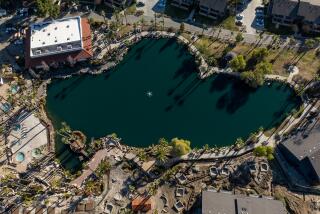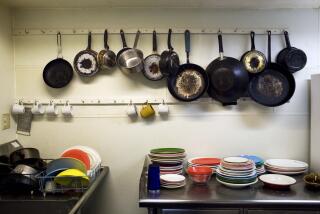At Schloss Elmau in Germany, the focus is on deep relaxation
When people who have been to Schloss Elmau meet, words tend to fail them. But they exchange a certain look that says it all.
The hotel nests in the foothills of the Bavarian Alps, the land of mountains with such names as Alpspitze, Höllentalspitze and Zugspitze (all taller than 8,000 feet), chalets banked by massive woodpiles, churches with steeples shaped like onion bulbs and fantastical castles built by Mad King Ludwig II, who ruled the region from 1864 to 1886.
To get here on a rainy spring afternoon, I took the A95 highway about 70 miles south from the Munich airport to the town of Garmisch-Partenkirchen, the site of the 1936 Winter Olympics. Near the village of Klais, I turned onto a private road that fingers into the Elmau Valley before petering out to walking paths and logging tracks.
From a distance, the hotel looks like a monastery, a yellow building with a pinnacled tower. Behind it, fog swirled across the wide, rocky face of Wetersteinwand mountain on the valley’s southern side. Handing my car keys to the valet parking attendant, I resigned myself to foul weather and the prospect of a long-anticipated two-night stay at the hotel without “The Sound of Music” views.
After I checked in, a staff member showed me around, beginning with the ground floor of the building. It is set around a courtyard, with four wings traversed by wide, carpeted hallways leading to a well-stocked bookstore, a blissfully quiet library, a buffet-style dining room, a cozy fondue restaurant, a piano bar and a terraced lounge full of nooks where solitary souls were lost in novels and families played Monopoly.
THE BEST WAY TO ELMAU, GERMANY
From LAX, Lufthansa offers nonstop service, and United, Lufthansa, KLM, Air France and British offer connecting service (change of planes) to Munich. Restricted round-trip fares begin at $416. The spa is about 80 miles southwest of Munich via the A95 highway.
Schloss Elmau Luxury Spa & Cultural Hideaway, 82493 Elmau/Oberbayern; (49) 8823-180, https://www.schloss-elmau.de/english/index.html. It has three swimming pools, six restaurants, two concert halls, a spa and a range of summer and winter sports. There are 40 categories of rooms, including accommodations designed for families and a luxury Under the Roof suite. Rates about $150-$470 a person, based on double occupancy, including munificent breakfasts and dinners.
On the lower level, we peeked into the family spa with its large indoor pool, then followed an underground passage to the new wing. It has four floors accommodating a Turkish hamam, or bath; a unisex, clothing-optional spa for adults; and a women-only spa, along with two more pools, one on the roof open to the elements and another on the lawn, filled with saltwater as warm as a bath. There were myriad Finnish saunas, steams rooms, a treatment center and cushioned chaise longues on which people napped, wrapped in towels.
Only when we reached the second floor and my corner suite with a sitting area, a vast bed, a balconied bath, orchids and fresh fruit did I realize that there were far worse fates than being forced to stay indoors at Schloss Elmau.
The hotel, a German national monument, was built in 1916 by philosopher-theologian Johannes Müller as a cultural retreat. He and like-minded intellectuals gathered here to discuss religion and politics, to hike, ski and rusticate in the glorious Alps. They attended literary lectures, concerts by famous musicians and dance soirees where guests were prohibited from talking while they waltzed and fox-trotted.
But while guests danced in silence, the Fascists came to power, and like so many other Germans of the time, Müller made compromises. He never joined the Nazi Party. He abhorred anti-Semitism and sheltered Jewish friends at the hotel during the Third Reich. But for convoluted philosophical reasons, he publicly endorsed Hitler in 1933 and refused to believe reports about concentration camps.
When World War II ended, the Allies launched a program to remove former Fascists from positions of power in Germany, leading to Müller’s conviction in a local court for idealizing Hitler. The hotel was confiscated and served for a time as a sanitarium for Holocaust survivors. Ruined and ashamed, Müller died in 1949.
His heirs managed to regain the hotel but spent years squabbling over its management, embittering younger family members such as Dietmar Müller-Elmau, a grandson of the founder. He came of age in the 1960s, part of a generation that bore no responsibility for the Third Reich but shouldered collective guilt for it.
Wanting nothing to do with Schloss Elmau, he went to India on an extended gap year, got a master’s degree at New York’s Cornell University and moved to Munich, where he started Fidelio Software, a hotel management computer system. After he sold the company in 1996, his father persuaded him to return to Schloss Elmau, then on the verge of bankruptcy.
As manager, Müller-Elmau transformed the hotel, adding amenities, welcoming world-class musicians who perform for room and board, and holding political symposiums in collaboration with organizations such as the German Marshall Fund. Gatherings of great minds tried to sort out the ethics of genetic research, globalization, Zionism and the Palestine problem, giving Schloss-Elmau a high profile in political science circles while driving away longtime guests.
In 2005, fire devastated the hotel. Muller-Elmau helped shepherd all 450 guests to safety and rescued the Steinway pianos as firefighters battled the flames. When it was over, two-thirds of the building was uninhabitable.
Müller-Elmau and I were dining in the hotel’s Wintergarten restaurant when he described his reaction.
“I was happy,” he said. “I thought the more of it that burns, the better.”
The fire gave him a chance to do what he wanted with Schloss Elmau, using his intuition to create a hotel that is deluxe in every respect. He added new restaurants and a resplendent adult spa, gave the décor a stylish Asian accent and turned most of the guestrooms into generously sized suites. When it reopened in 2007, room rates had doubled, further disenchanting those who loved the old Schloss Elmau.
Perhaps it takes a newcomer to notice and appreciate quirks that set it apart from standard-issue luxury hotels. Above all, Schloss Elmau redux loves families, an important feature for Müller-Elmau, who has a passel of kids himself. There are children’s programs, including a ski school for tots, playgrounds with trampolines, a family spa and a sumptuous buffet-style restaurant where over-the-moon little ones eat ice cream while holding helium-filled balloons.
Room rates include breakfasts so prodigious that no one needs lunch — think made-to-order omelets, smoked salmon and pickled herring, free-flowing Champagne for mimosas, a dozen kinds of homemade jam to slather on muffins, bagels, croissants, brown bread and coffee cake — and dinner in any of the hotel’s six restaurants. Only at the Michelin-starred Luce d’Oro is there an additional cost for meals of more than 48 euros (about $62) a person.
The Under the Roof suite, with sterling views and a Bose sound system, is expensive, to be sure, suitable for corporate executives, heads of state and the tremendously well-heeled. But the hotel also has more modest rooms tucked under the eaves within the reach of ordinary people like me.
I spent awhile settling in and wandering around, stupefied, before heading for the spa. I had a masterful massage, swam laps in the rooftop pool while raindrops pelted the surface of the water and claimed a chaise in one of the blissfully peaceful ruheraums, or resting rooms, where I started to understand that the German spa experience is fundamentally different from the American.
Though the complex has a workout room and occasional fitness classes, it’s dedicated more to deep rest and purification than exercise and self-improvement. And then there’s the German custom of nude spa-going. Unused to it, I wore my bathing suit until I found myself alone in a steam room and decided to shed it. Just as I finished undressing, an unclothed man entered and started chatting with me genially, as if we weren’t both as naked as jaybirds.
He was from Paris, he said, but came often to Schloss Elmau because he’d found no spas approaching it in France. He especially loved to sit in the steam room exfoliating his skin with salt crystals from a mound outside the door. He demonstrated, then asked me to do the bits of his back that he couldn’t reach. I did a pathetic job of it. He insisted on returning the favor by rubbing salt all over me.
I made a polite escape and later learned that he was a French bank president, though I never saw him after that, or perhaps I failed to recognize him in clothes.
But if we ever meet again and start talking about spas, I think we’ll know each other immediately by our Schloss Elmau smiles.
More to Read
Start your day right
Sign up for Essential California for news, features and recommendations from the L.A. Times and beyond in your inbox six days a week.
You may occasionally receive promotional content from the Los Angeles Times.






